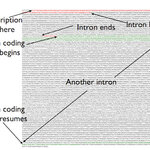
University of Iowa researchers have learned more about a genetic mutation that contributes to autism. The mutation occurred in sperm cells of a father, who does not have autism, but passed the condition on to two of his children.
The investigators now know more about how the mutation causes problems with a specific gene and are testing for additional mutations of the same gene in other people with autism. Thomas Wassink, M.D., associate professor of psychiatry in the UI Carver College of Medicine, is presenting the findings May 3 at the annual International Meeting for Autism Research in…
